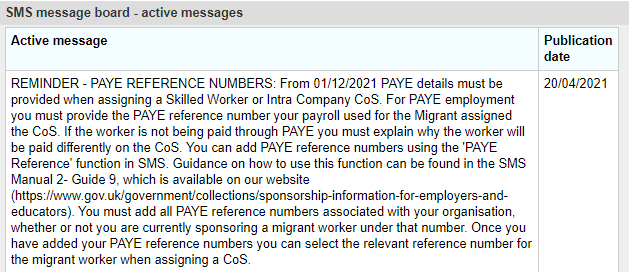UK immigration in brief: a summary of upcoming changes
Published on 13th May 2021
With the ending of many Covid-19 concessions, and the UK government still planning its post-Brexit migration strategy, we highlight key upcoming changes to UK immigration. This includes an overview of the concessions ending, new visa routes available for graduates and Indian nationals, and amendments to the Shortage Occupation list.
Upcoming key changes
During the last few weeks, there have been various interesting updates by the government affecting sponsor licence holders.
Right to Work concession is now ending on 20 June 2021
All employers must check an employee's Right to Work document before the employment commences and to obtain the necessary evidence in the formatting prescribed by the government which gives the company a statutory defence against potential illegal employment. This must also happen if an employee obtains a new visa by either changing visa categories or extending the same visa. The key is that the check is conducted prior to the commencement of the employment.
As many would recall last year due to the Covid-19 pandemic, the government helpfully introduced a concession to allow companies to review Right to Work documents remotely by relying on scanned copies which were verified in a video call between the company and employee. The concession followed a requirement for companies to conduct retrospective physical Right to Work checks within 8 weeks of the measures ending.
An update was provided by the government confirming that the Right to Work Covid-19 concession will end on 16 May 2021 and within weeks after heavy criticism it was extended until 20 June 2021. Any new Right to Work checks from 21 June 2021 will either need to be in person by checking the original document or an online check. The issue is that the online checking service is only available to those with a Biometric Residence Permit or those with status under the EU Settlement Scheme. This significantly disadvantages those simply relying on their passports as evidence of their right to work, including British nationals, as they can only proceed with the physical document check.
The change has come as a shock as it is not in line with the government message of individuals working from home where possible but the extension indicates that the government has tried to tie this with the end of the Covid-19 restrictions in June. Many companies have not returned to office working, some have stopped leasing office premises due to the uncertainties of the pandemic and to reduce costs, and various companies are still deciding whether they will ever go back to having a permanent office.
There is likely to be a drive from various firms, bodies and stakeholders to push the government to extend this deadline further to allow companies more time to adjust to what the world would look like as we emerge from the pandemic – but there are no guarantees a second extension will be implemented. At the moment we have to consider 20 June 2021 as the last date the Right to Work concession can be used.
The one useful aspect from the update has been that retrospective checks are not needed as was first indicated by the Home Office. Therefore, employers can rely on the Right to Work documents obtained remotely from 30 March 2020 until 20 June 2021 and no further action is needed on these.
How to plan ahead:
- If there are upcoming new hires in the next few weeks then conduct the Right to Work check by 20 June 2021 to ensure you can use the concession.
- Arrange one day every week, fortnight or month from 21 June 2021 where the office is open for all new hires to bring their documents for the Right to Work documentation to be reviewed and certified copies taken. Planning is key for this to ensure the checks are conducted before employment commences.
- Request new hires or those with new visas to send their original documents by secure and trackable post to a HR contact in order for the HR to take a certified copy of the document and then return to the individual. A video call is still needed with the individual to check the photo matches the original documents. This option is likely to be burdensome to both the company and individual and some individuals may not feel comfortable sending their original documents, but unless options one and two are available, this is the only alternative.
PAYE requirement for all sponsors on the online licence
PAYE, also known as Pay As You Earn, is a system that collects UK income tax and national insurance from salaries paid to employees. Most companies must register to have a PAYE scheme reference number.
As part of changes made to the immigration rules towards the end of last year, companies with a Sponsor Licence to sponsor Skilled Worker visas (previously known as Tier 2 General) and Intra-Company Transfer visas (previously known as Tier 2 Intra-Company Transfer) are now required to confirm the PAYE number the individual will be paid under on the Certificate of Sponsorship (CoS). If the individual is not paid under PAYE, this must be disclosed on the CoS with an explanation.

A recent update (shown above) on the Sponsor Management System has confirmed that all companies with a Sponsor Licence must confirm all PAYE numbers associated with their organisation to the licence even if there are no sponsored employees working under those PAYE numbers.
This follows the direction the government are taking with different government bodies sharing data to ensure compliance and another way for the government to check sponsored employees are paid the salary stated on their visa applications. It also tackles situations where sponsored employees are moved from one company to another company within the same organisation structure.
There are now more ways for the government to be notified of non-compliance and increased likelihood of compliance visits. It is therefore important to look at all PAYE reference numbers associated with your organisation and ensure the relevant updates are made as soon as possible. As always, it is essential any changes to salaries or job title and descriptions to be reported against a CoS within ten working days of the change to sure compliance with the record keeping duties.
New young professionals scheme for Indian nationals
There has been a recent announcement that the UK government will be introducing a new two-year visa category from 1 July 2021 called the Young Professionals Scheme for Indian nationals aged 18-30. There is a limit of 3,000 applications a year and we will need to wait for the immigration rules to be released to understand the exact requirements for this route. This is in addition to the graduate scheme which is also opening in July for those that have completed degrees in the UK.
It is another visa route which does not require sponsorship from a company and allows flexibility in terms of living and working in the UK. For most sponsors this is welcome news as it is likely to reduce the costs of sponsoring an employee under the traditional Skilled Worker visa route – this is subject to the visa process and fees which the government should release soon.
The update also mentions that India is the first country that the scheme will be open to which indicates more countries will be added to the scheme. It has been described as a cultural and professional exchange programme between the two countries and once the full details are released it will be easier to compare this category against the Youth Mobility visa currently in place for certain nationalities.
As part of the agreement, there have been negotiations to improve co-operation for returning Indian nationals without legal rights to live and work in the UK. Again, this follows a predominant trend that the UK government will be focusing on compliance visits to tackle illegal workers and stayers in the UK.
Changes to the shortage occupation list
Since the start of the Covid-19 pandemic, the government has seen an increase in the need for healthcare professionals in the UK.
The Shortage Occupation list currently has an extensive list of healthcare roles that migrant workers can apply to enter the UK under. However, the Home Office is changing the Immigration Rules so as to allow for more healthcare roles to be available and thus allowing more opportunity for migrant healthcare workers to come to the UK.
Pharmacists, laboratory technicians, senior care workers and nursing assistants are among roles that have been added to the Shortage Occupation List. Health services and public health managers and directors, residential, day and domiciliary care managers and health professionals not elsewhere classified, such as audiologists and dental hygiene therapists, have also been added to the Shortage Occupation List, as have modern foreign language teachers.
The new roles have opened up the talent pool from all over the world but also the employee pool for employers.
This also builds upon the new points-based immigration system that the government has introduced. Individuals applying to come to the UK under a skilled worker visa must obtain 70 points to be considered eligible. However, a role on the Shortage Occupation list is worth 20 points, which means that with the required level of English, employees can easily meet the 70 points. In this way the pool of potential employees has become much wider giving employers more scope to fill the vacancies in their sectors





